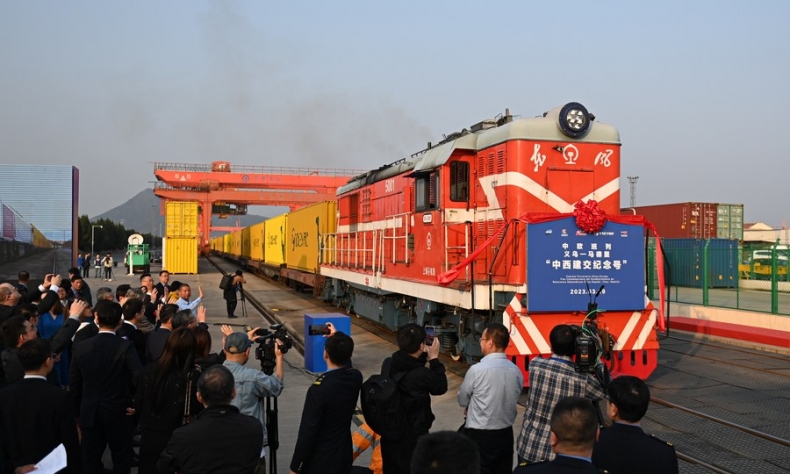China-Europe Freight Trains Pave Way for Prosperity

The Yiwu-Madrid freight rail service, a key part of the Belt and Road Initiative, is an opportunity for European companies to enter the vast Chinese market.
As the Belt and Road Initiative (BRI) marks its tenth year, the Yiwu-Madrid freight train line (Yixinou), one of over 80 train lines now connecting Europe and China across Eurasia, will also embrace its ninth year in service in November. On July 29, a freight train bound for Madrid, Spain, departed from Yi Wu in east China’s Zhejiang Province, marking the 10,000th China-Europe freight train trip this year alone.
Meanwhile, this year also marks the 50th anniversary of China-Spain diplomatic relationship. In September 2014, the then Spanish Prime Minister Mariano Rajoy visited China and just 50 days after his meeting with Chinese President Xi Jinping, the first cargo train operated by Yixinou arrived in Madrid from Yiwu, crossing more than 13,000 kilometers in less than 20 days. The express railway connection was developed as part of the BRI and is one of its early achievements.
This March, Spanish Prime Minister Pedro Sánchez visited Beijing ahead of Spain assuming the presidency of the EU. Sánchez said coordination and collaboration between the major international players (which included China, the EU and the U.S.) was necessary to address the world’s biggest challenges today: security, trade, peace and global warming.
Spain is one of the important exponents of the BRI in Europe, and the Yiwu-Madrid China-Europe express rail service has today evolved to cover over 50 countries and regions and more than 160 cities in Eurasia. The link between Asia and Europe grows stronger every day, and Spain’s exports to China are increasing every year.
Many factors have contributed to this success, including the competitiveness of Spanish companies and the high quality and value of Spanish products. The train connection is a competitive advantage to achieve that goal with direct point-to-point international freight railway lines.
This year alone, a total of 1,181 Yixinou trains were operated on the route by August 30, delivering nearly 98,000 TEUs of goods, which marked a year-on-year increase of 12.5 percent. So far, the cumulative number of trains has exceeded 6,100 and the shipping volume crossed 500,000 TEUs.

All these achievements were possible due to the support of the Spanish and Chinese governments and the institutions in both countries. Many countries have embraced the BRI, from those in Asia and Europe to even those across South America. However, there are still many governments, institutions, companies, industries and other stakeholders in the international arena that do not know yet what it is about. The lack of knowledge about the BRI is one of the major problems in achieving maximum capacity during the trains’ return journey from Europe to China.
Although the BRI was proposed by China, Beijing does not seek its dominance. China proposed the BRI as an integrated project, which not only promotes business and cultural exchanges with China but also among the countries and regions that embrace it.
The BRI is not only about trains, airports or infrastructure, but much more. It is the umbrella almost covering everything related to China in terms of the economy, politics, development, infrastructure and trade.
China had been focusing on its domestic economy for the last decades, with great results. But after reaching a considerable level of development, in order to make it sustainable, it needed to go global. The BRI is a consistent plan of internationalization. It represents a chance for China to expand exports and also an entrance to the Chinese market for countries involved.
The Yiwu-Madrid train service, like any project of this magnitude, has challenges. For instance, the service still needs to include refrigerated containers for transporting goods that require a controlled temperature. Doing so will create a revolution for the Spanish fruit and vegetable industry. But the biggest challenge the Yiwu-Madrid train faces is to present itself as a logistics alternative.
Meanwhile, it is also an opportunity to approach the Chinese market. To achieve that goal, more leading companies in China and Spain should join the project, creating a win-win situation where both can secure their supply chains through a regular and reliable railway connection. The train is not intended to replace maritime transport. Rather, it offers an alternative for companies that want to exchange goods and services with China, adding value to the entire export process.
The China-Europe freight train service is not a strategic vision or conception any longer, but a reality. As a flagship program of the BRI, the freight train service spreads the spirit and values of the BRI to countries along the lines.
Carlos Santana is director of the Advanced Program in Supply Chain at IE Business School in Madrid and former General Manager of Yixinou Spain.
 Facebook
Facebook
 Twitter
Twitter
 Linkedin
Linkedin
 Google +
Google +










